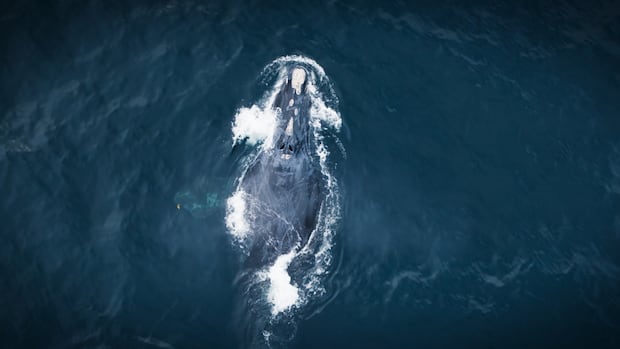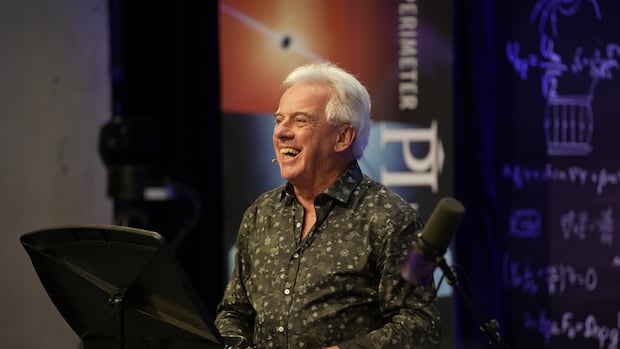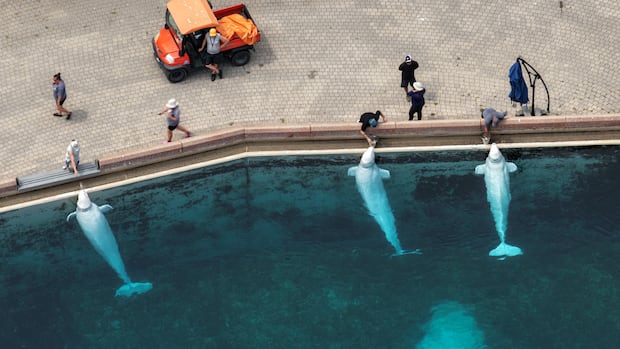Two University of New Brunswick researchers are preparing for another cruise into the Gulf of St. Lawrence this week to study endangered North Atlantic right whales.
And the timing just happens to correspond with the release of an Apple TV+ documentary series featuring six of the world’s most endangered animals.
Kim Davies, an associate professor in biological sciences, had a hand in the episode on right whales.
“This production we did last year was the largest one I’ve ever been involved with,” Davies said.
The Wild Ones has episodes dedicated to Malayan tigers, Gobi bears, Javan rhinos, Caucasian leopards, western lowland gorillas, and North Atlantic right whales.
The series, from U.K.-based production company Offspring Films, was released on July 11.
Davies runs a research program on the right whales that inhabit New Brunswick waters in spring, summer and fall.
Currently, only about 350 North Atlantic right whales are left, with even fewer reproducing females, Davies said, and the population is well below the target for recovery.

Davies said the team goes out every year to do various research projects, and recently, started using new technology to tag the whales using drones.
The drones will fly over a whale and drop the tag, which will suction to the whale, she said. The tags have cameras on them, allowing for underwater footage.
The film crew of The Wild Ones attended last summer’s cruise, filming from its own boat and then joining the researchers on Davies’s boat during the tagging to capture the underwater perspective.
“Any underwater footage that you see from the perspective of the whale in the documentary will be our research program’s contribution to the work,” she said.
Researchers from the University of New Brunswick and Dalhousie University had a hand in a new Apple TV+ documentary series that delves into the world’s most dangerous animals. The researchers helped filmmakers get a closeup look at the North Atlantic right whale.
UNB, Dalhousie University and Ocean Alliance researchers were in charge of putting the cameras on the whales for the underwater footage. Davies said the Canadian Whale Institute and Fisheries and Oceans Canada also played a role in the production.
Jillian Carter, a UNB graduate student, was on board last summer doing her own research on what right whales are eating.
“In order to protect the right whales, we need to know where they’re going to be and where they usually are is linked to what they’re eating in the summertime,” Carter said.
She said right whales eat small marine crustaceans called copepods, which are smaller than a grain of rice.
While Carter wasn’t directly involved with the tagging research or filmmaking, she said the experience itself was surreal.
“It has been a lifelong dream of mine to work on boats like this, and then to have an Apple TV+ film crew come aboard, it’s kind of like, ‘Wow. I can’t believe this is real life.'”

Davies said the underwater footage was helpful for the TV crew, but it’s also important to scientists to answer fundamental questions about how the whale behaves and uses its environment.
And she said researchers still have questions about how right whales become entangled in fishing gear underwater.
While they have yet to observe an underwater entanglement with a tagged whale, she said, if they keep tagging, they might eventually observe it and learn more about how entanglements happen.
Although Davies has worked with other film crews in the past on right whale documentaries, having an episode decided to the whale on a streaming service with the international reach of Apple TV+ will likely have a positive effect, she said.
The series could educate audiences who haven’t had access to previous films about right whales, she said..








